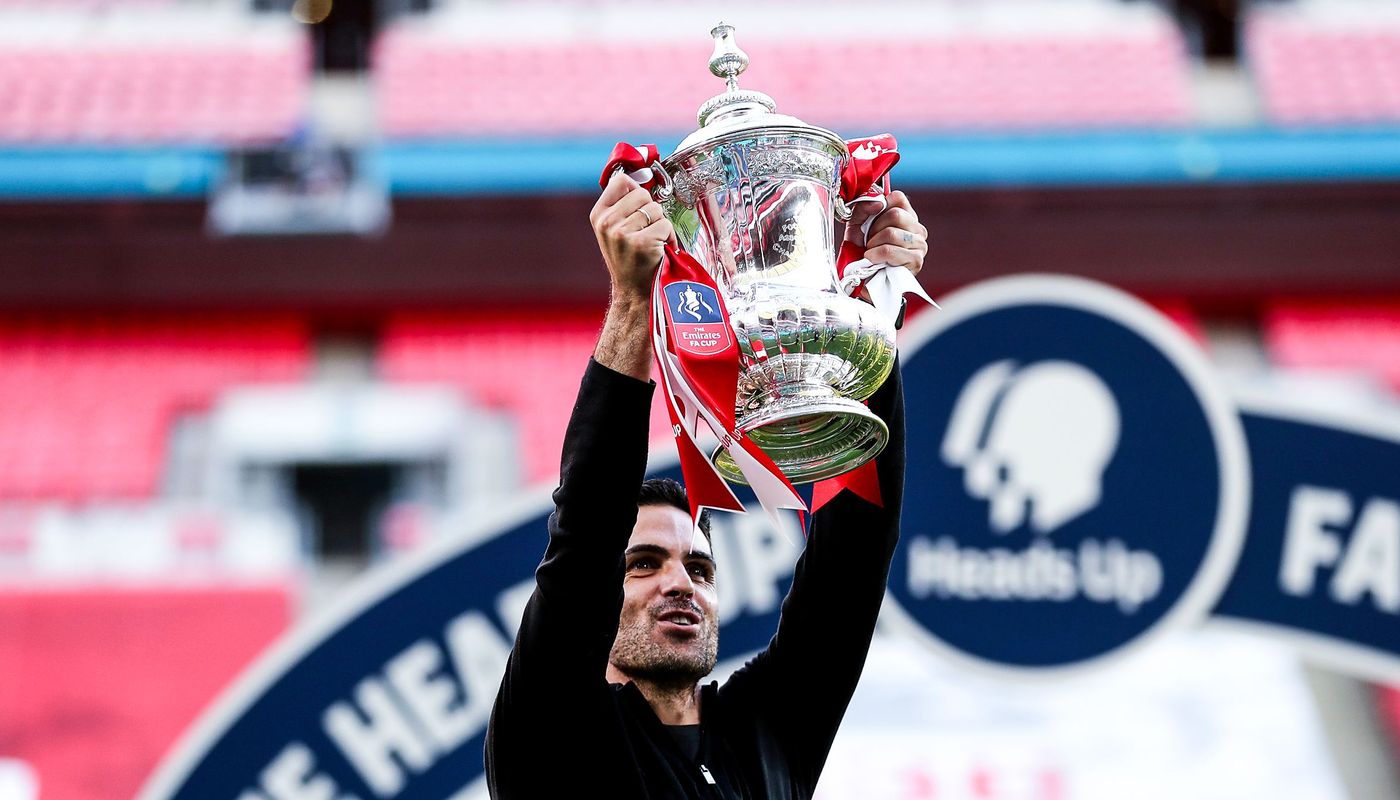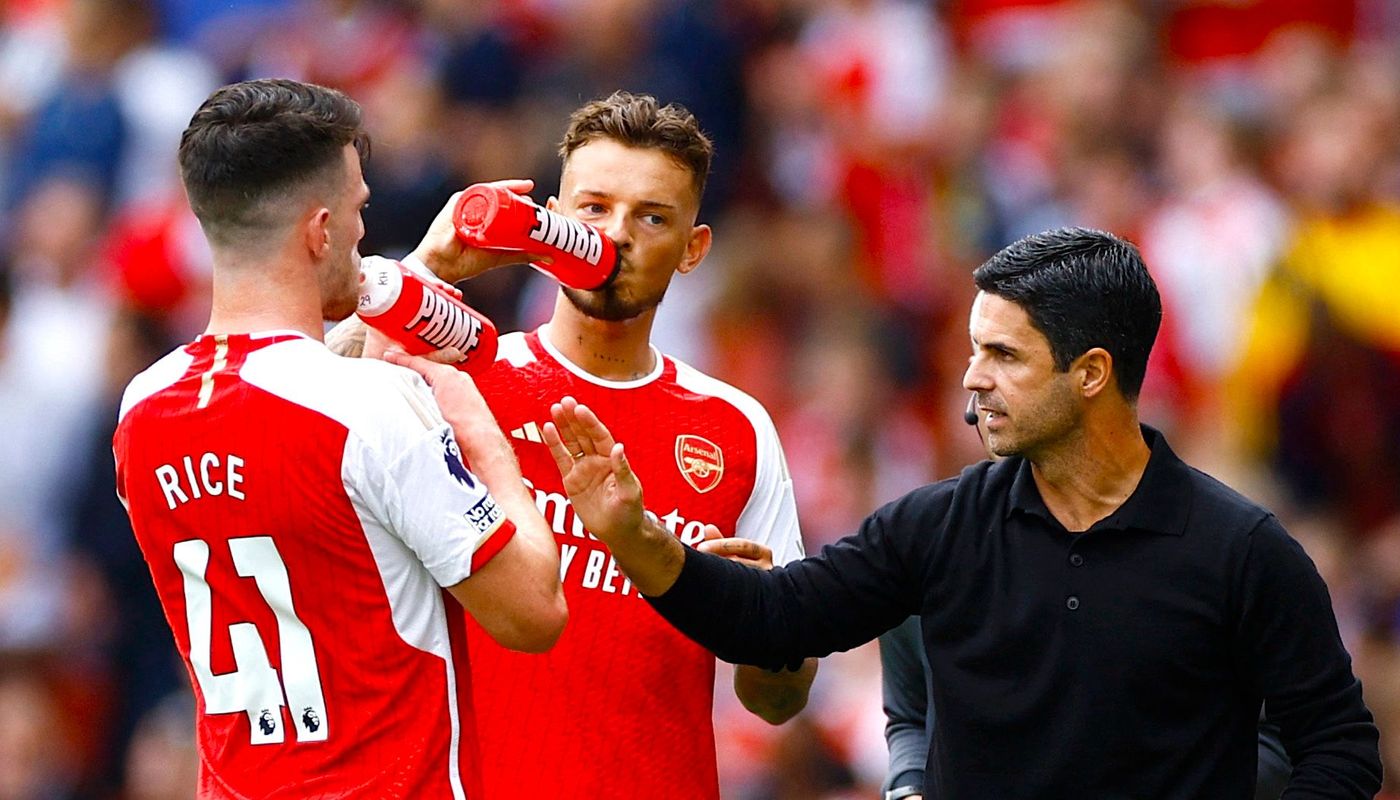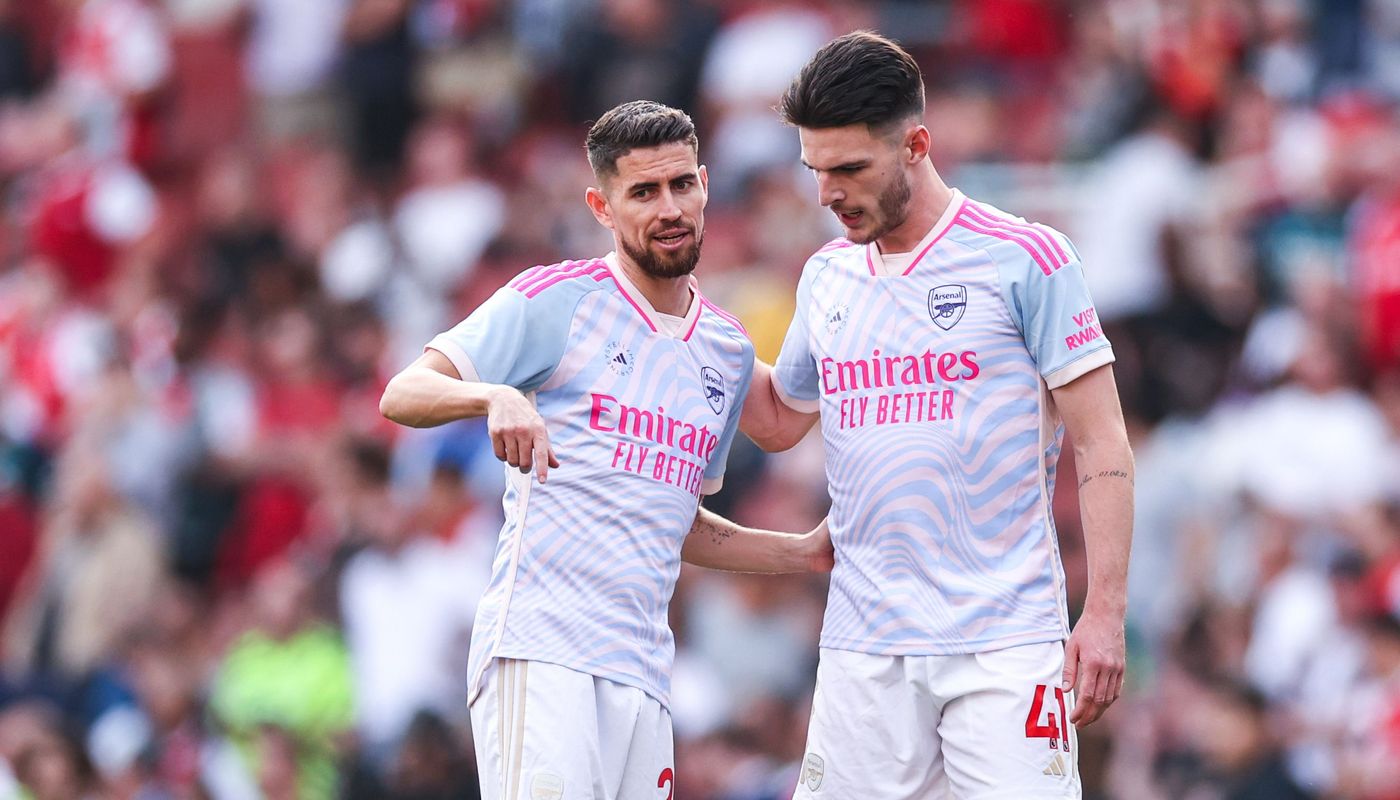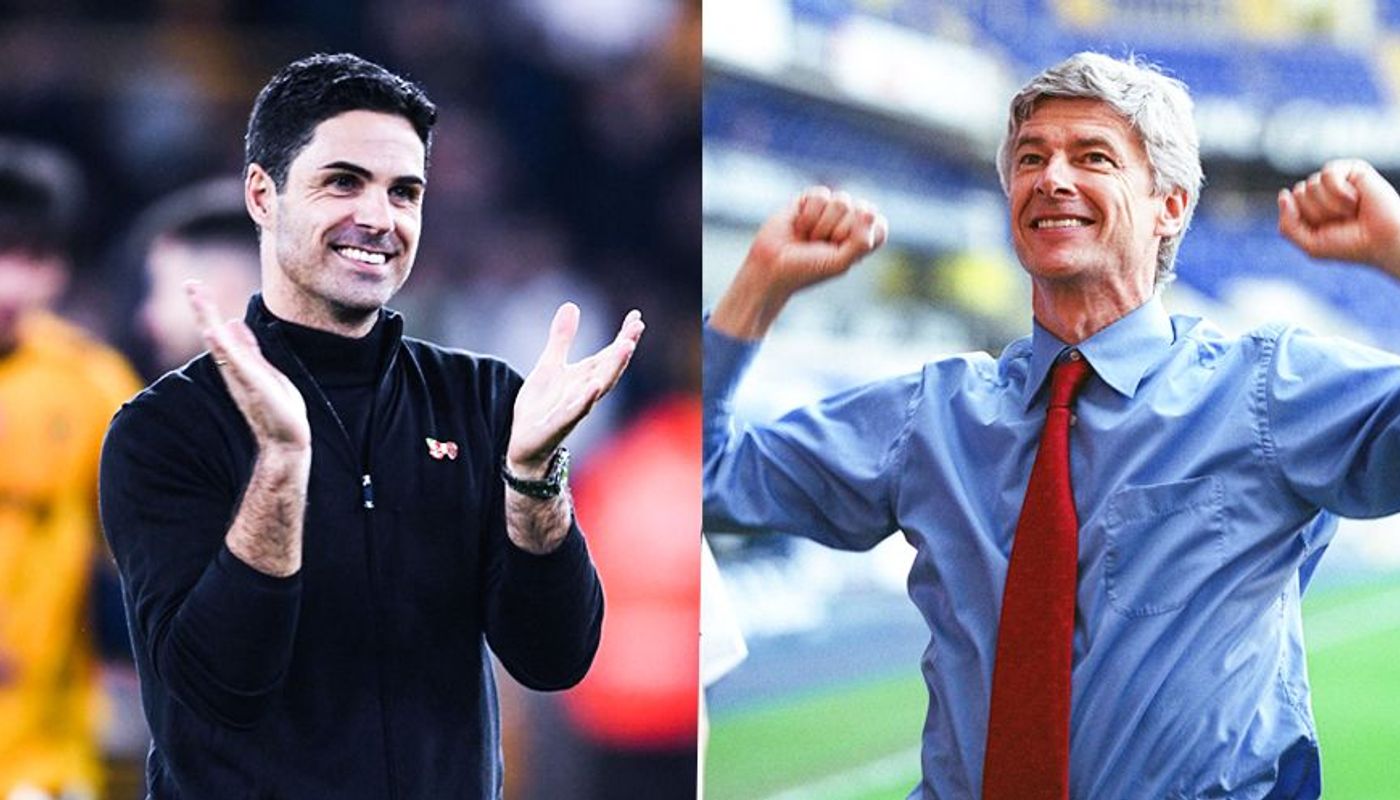Ahead of Mikel Arteta's 200th match in charge of Arsenal, Alex Keble compares the Spaniard's record to that of Arsene Wenger over his first double century.
Mikel Arteta (Arsenal)
Arteta takes charge of his 200th match in all competitions as Arsenal manager this weekend and regardless of the result at Brentford, he will have won more matches in his first double century than any other person to lead the Gunners – including Arsene Wenger.
That simple fact means it is worth comparing the two managers ahead of Arteta’s anniversary, because Wenger - who won three Premier League titles and seven FA Cups over 22 years at the club – is, of course, the benchmark by which all who take charge of Arsenal must be judged.
Here, we take a retrospective look at Wenger’s first 200 matches at Arsenal and ask whether Arteta’s start suggests he can be similarly successful further down the line.
How Arteta’s and Wenger’s records compare
Arteta’s current record (W115 D34 L50) will include at least three more victories than Wenger (W112, D52, L36), although it goes without saying Arteta isn’t at the standard set by Arsenal’s greatest-ever manager.
First of all, if we award three points for each win and one for each draw, Wenger amassed 388 points compared to Arteta’s 379-382 at the 200-match mark.
Wenger/Arteta first 200 matches comparison
| Arsene Wenger | Record | Mikel Arteta | Record |
|---|---|---|---|
| 1996/97 | P36 W16 D11 L9 | 2019/20 | P28 W16 D6 L6 |
| 1997/98 | P54 W33 D13 L8 | 2020/21 | P58 W29 D12 L17 |
| 1998/99 | P53 W30 D15 L8 | 2021/22 | P45 W26 D4 L15 |
| 1999/00 | P57 W33 D13 L11 | 2022/23 | P49 W32 D8 L9 |
| - | - | 2023/24 | P19 W12 D4 L3 |
| Total | P200 W112 D52 L36 | Total | P199 W115 D34 L50 |
And then there’s the trophy cabinet. Wenger had already won the Premier League and FA Cup double, in 1998/99, by the time he hit the milestone.
In Europe, he reached the UEFA Cup final in 2000, losing to Galatasaray on penalties in his 202nd match, but otherwise struggled, failing to get out of the UEFA Champions League group stage in 1998/99 or past the UEFA Cup first round in 1997/98.
Arteta, meanwhile, has won one FA Cup, just like Wenger, but only reached the semi-finals of the UEFA Europa League (in 2020/21) and has been nowhere near as successful in challenging for – or winning – Premier League titles.

Wenger’s 90s revolution is unrivalled
Before we can pick out the best bits of Arteta’s reign and compare them favourably to Wenger’s beginning, it’s worth reminding ourselves of just how special – and just how innovative – Wenger was when he arrived in English football in October 1996.
Tactically there was a clear movement towards keeping the ball down, with players expected to pass through midfield rather than play the direct and longer-ball game that dominated English football at the time.
But the groundwork for this stylistic shift had already been laid by Bruce Rioch, plus the more memorable aesthetic football of the Wenger era would come much later in the early 2000s.
In fact, in the first season and the double-winning campaign of 1997/98, there was a very-English power and feistiness to how Arsenal played. Tactics were not Wenger’s main contribution.
The more important modernisations were the physiological improvements; the influx of foreign players who helped change the technical and tactical style; and the dietary culture shift.
English football in the 1990s can seem laughably antiquated to a modern audience. Out went the drinking culture and its training-day hangovers. Out went the fish and chip suppers and the eating challenges on the team bus.
In came vitamin supplements, strict dietary instructions, pilates and yoga, and an all-round professionalism that gave Arsenal a huge advantage over their rivals.
Wenger was also a genius at buying players, bringing in Patrick Vieira, Nicolas Anelka, Marc Overmars and Emmanuel Petit in the first 12 months, tapping into the foreign market in a way no English team had done before.
This shifted the tactical side of things, too, as Arsenal moved from a 3-5-2 to a 4-4-2 formation that was reminiscent of a modern lopsided 4-2-3-1, with Dennis Bergkamp dropping behind Anelka.
Arteta has similarly modernised Arsenal
Although Arteta has nowhere near matched Wenger’s achievements in the first 200 matches, he has taken them from a lower starting point, making his own transformation more impressive than it might appear.
Granted Arsenal were five years without a title on Wenger’s arrival, but Rioch had left the club in a relatively strong position while the Gunners of 2019, when Arteta came in, were in relative terms much further off the summit of the Premier League.
A direct comparison of the speed of transformation is, therefore, a little unfair on the current manager, and although there was no explosive revolution behind the scenes for Arteta, his tactical ideas are arguably more complex than Wenger’s.
The Frenchman wasn’t innovative from a European perspective, but rather brought over ideas unfamiliar to English players. By contrast, Arteta’s Pep Guardiola-inspired tactical complexity looks as good as almost anything in Europe.

What’s more, Wenger was not much of a reactive coach, instead firmly sticking to his principles rather than researching and preparing for opposition flaws (which became a serious issue from 2005 onwards), whereas Arteta’s first 200 matches have been defined by numerous trials and variations.
However, a direct comparison between two eras that are 30 years apart is a little flawed, and it is perhaps fairer simply to say that both Arteta and Wenger modernised Arsenal in their own ways.
The passing game Wenger introduced was a game-changer, particularly in later years, and although it took a little longer to take hold, Arteta’s intricate Guardiola-style football has also brought Arsenal in line with contemporary standards of excellence following the wayward final years of Wenger and the brief experiment with Unai Emery’s reactivity.
Arteta evoking Wenger’s early defensive solidity
Arteta’s first strong Premier League season came a year later into his reign than Wenger’s, for reasons explained above, but once things clicked there was more than a little Wenger about it.
In fact, Manchester City’s unprecedented dominance of the division is the biggest difference between Wenger’s double-winners and the title challengers of 2022/23.
Arsenal won 84 points last season, which is more than Wenger won in any campaign during his first 200 matches in charge and higher than all-but two of Wenger’s seasons (2001/02 & 2003/04).
A lower points tally for champions (78 points in 1998/99) doesn’t in any way weaken the achievement, but it does suggest Arteta’s Arsenal have things a little tougher, being up against the relentless Man City machine.
What’s more, looking at the Arsenal of 2023/24 and the early Wenger days, the comparisons begin to become more obvious.
There is something about the arrival of Declan Rice, and Arsenal’s frequent shift to using him in a double-pivot with Jorginho, that evokes Petit and Vieira side-by-side in the first iteration of the Wenger era.

Power and defensive solidity were the secret - or at least half-forgotten - ingredients in 1997/98, when the Gunners kept 18 Premier League clean sheets.
Similarly, Arteta has pivoted to robustness this season. Last season’s second-half downturn, when Arsenal went from 50 points from the first 19 matches to 34 from the second 19, is explained entirely by their defensive record: they went from 45 scored and 16 conceded in the first half to 43 scored and 27 conceded.
It’s no surprise, then, that Arsenal are looking more cautious in attack and, via Rice, boast the joint-best defensive record in the division this season, with 10 goals conceded.
An aesthetically-pleasing possession game underpinned by defensive clout: it’s a foundation for success that both managers share.
Arteta faces more daunting landscape
Whether or not the successes of Arsenal’s 2022/23 campaign, limited as they were by the absence of silverware, are comparable to Wenger’s early days at the club is in the eye of the beholder.
Clearly there is no comparison on trophy count, or indeed on revolutionary input for the English game.
But the bar is significantly higher these days and the financial landscape completely different.
Unlike in the late 1990s, modern Arsenal - out of the Champions League for five straight seasons - are competing with at least four rivals boasting immense wealth in a cluttered field producing ever-higher standards.
To win the league ahead of Man City these days requires an Invincibles-like season of excellence. That might be on the cards at some point under Arteta. But until then, there’s just no competing with what Wenger did.



